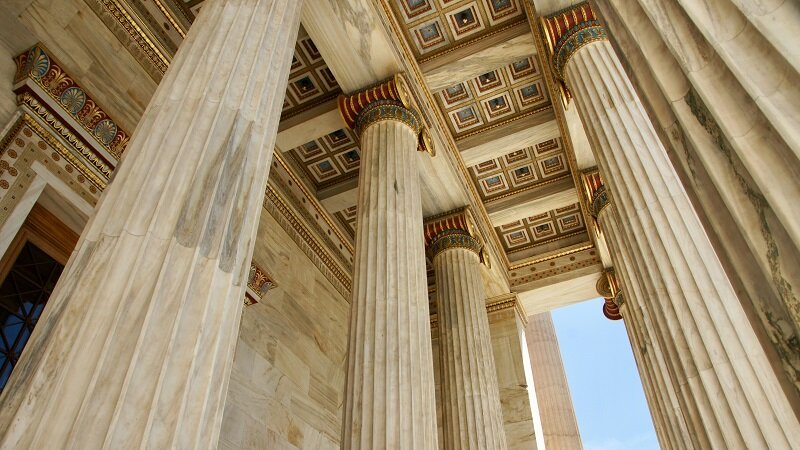Plato’s Republic: The City and the Soul
Episode #4 of the course Ancient Greek philosophy by Dr. Will Buckingham
Hello again. In this lesson, we’re going to be looking again at Plato and in particular, exploring his most famous and most influential book, The Republic. It is one of the greatest philosophy books ever written, and had nothing else written by Plato survived to the present, he would still be famous just for this one book.
About The Republic
Like most of Plato’s dialogues, the starring role in The Republic is given to Plato’s teacher, Socrates. The book begins with Socrates visiting the port of Piraeus, just outside of Athens. He runs into a few friends, and they all end up going to the house of a philosopher called Polemarchus, where they fall into conversation. Their talk is wide-ranging: They discuss justice, goodness, art and poetry, and the best way to run a city. Along the way, Plato also sets out his famous thought-experiment of the cave, which we looked at in the previous lesson.
In today’s lesson, we’re going to look at two of the questions that Plato explores in The Republic. The first is the question of what the ideal political state looks like. The second is the question of the nature of the soul. Perhaps surprisingly, these questions turn out to be linked.
A Divided Soul
Let’s start with the soul. When asking about the soul, Plato is essentially asking about human nature: What are human beings like? To answer this question, Plato says that the soul has three elements.
• The first element of the soul is the mind. This is the part of us that thinks and reflects, that can step back and take stock of the world, and that can reason about our actions and lives.
• The second element of the soul is what Plato calls “spirit.” This is the part of the soul that is full of fire and energy. It is what flares up when we get angry or engaged when we are in pursuit of a goal.
• The third element is our appetite, or the various bodily desires that we have: for food, comfort, sex, and pleasure.
All of us, Plato says, are a mixture of reason, spirit, and appetite. To live well, we need to get the balance of these things right. We need to make sure that we are led by reason, so our spirit does not take us galloping off in the wrong direction and we don’t just sink into fulfilling our bodily desires and appetites. In another of his books, the Phaedrus, Plato likens reason to a charioteer, spirit to a noble horse, and appetite to a badly-behaved horse. Our life is a kind of careening racetrack, where we are in a chariot pulled by these two horses: one noble but sometimes misguided, one ignoble and misguided. But a good charioteer will nevertheless get us where we want to go, directing the horses by means of reason and wisdom.
The Ideal City
In the Republic, Plato draws a parallel between the three-part soul and what he sees as the ideal state. Like the soul, Plato divides up the citizens of his imagined ideal state into three kinds.
• the philosopher-rulers, who guide the state through reason and wisdom, rather than through hot-headedness (or untethered “spirit”) and appetite (or unrestricted desire)
• the class of “guardians” who protect the city with their spiritedness but need to be directed by the philosopher-rulers
• the everyday folks—workers and producers—who are driven by their appetites
This may seem depressingly hierarchical. Some writers, like the philosopher Plutarch, have suggested that Plato based his ideal model on the brutal state of Sparta, thinking this preferable to the more lax and liberal Athens. But there are nonetheless interesting insights in Plato’s vision of the ideal state.
The first is that for Plato, both men and women can be philosopher-rulers. Unusually for the ancient world, Plato does not think that gender is a deciding factor when it comes to wisdom and the capacity for wise government.
The second is that Plato argues that the philosopher-rulers are precisely the kinds of people who would not want to be in power. The best rulers are those who know that the ruling state is not in their own best interests. For the common good, the wise should be compelled to take office, even though they’d rather not. In other words, Plato suggests that power is best wielded by those who want it least.
Reforming Plato’s Forms
Plato’s Republic has influenced everything from religion to politics. But since the beginning, Plato’s philosophy had its detractors, and as we have already seen, one of the greatest critics of Plato was his student, Aristotle. In the next lesson, we will turn to Aristotle and look at a fundamental problem he identified in Plato’s philosophy and how he proposed to resolve it.
Recommended reading
• Julia Annas’s book on Plato: A Very Short Introduction (Oxford University Press) is an excellent summary.
• The Republic is widely available in translation and a surprisingly easy read. I usually use the Penguin Classics edition.
Share with friends

